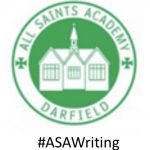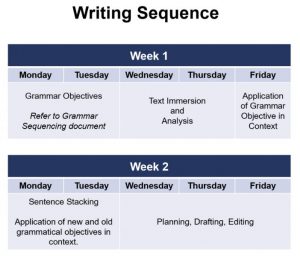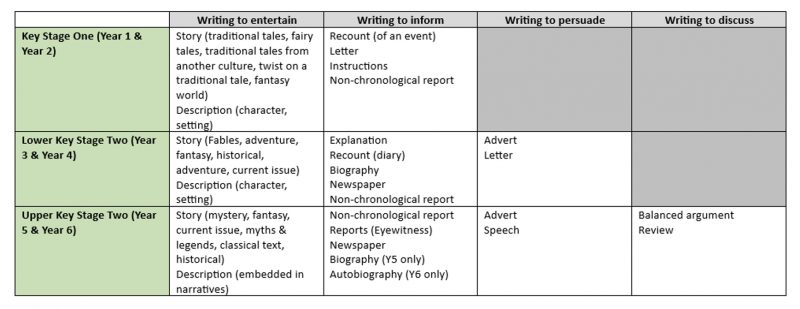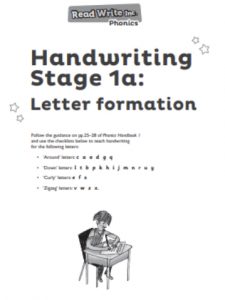Writing

 What do we want our children to learn?
What do we want our children to learn?
The writing curriculum at All Saints Academy is guided by the National Curriculum for English (2014). At All Saints Academy it is our intent to provide high quality learning experiences to develop children’s competence in both transcription and composition. It is essential that teaching develops children’s competence in these two dimensions. In addition, children should be taught how to plan, revise and evaluate their writing. These aspects of writing have been incorporated into our writing curriculum for composition.
Writing down ideas fluently depends on effective transcription: that is, on spelling quickly and accurately through knowing the relationship between sounds and letters (phonics) and understanding the morphology (word structure) and orthography (spelling structure) of words. Effective composition involves articulating and communicating ideas, and then organising them coherently for a reader. This requires clarity, awareness of the audience, purpose and context, and an increasingly wide knowledge of vocabulary and grammar. Writing also depends on fluent, legible and, eventually, speedy handwriting.
What does writing teaching and learning look like at ASA?
 Writing is taught within specific, meaningful, and effective contexts. We underpin our writing lessons with high-quality texts and/or curriculum led stimulus. Children have focused daily writing lessons which follow a clear sequence within a unit.
Writing is taught within specific, meaningful, and effective contexts. We underpin our writing lessons with high-quality texts and/or curriculum led stimulus. Children have focused daily writing lessons which follow a clear sequence within a unit.
Frequent opportunities to write are also planned across the curriculum.
Writing genres have been planned out across Key Stage 1, Lower Key Stage 2 and Upper Key Stage 2. Key Stage One focus on ‘Writing to entertain’ and ‘Writing to inform’ only. These strands are also repeated in lower and upper key stage two. ‘Writing to persuade’ is introduced in Lower Key Stage Two and ‘Writing to discuss’ is introduced in Upper Key Stage Two.
 Grammar objectives are taught explicitly at the start of a writing unit. These skills are initially taught out of the text type context to reduce the cognitive load on children. These skills are then applied within the text type context following text immersion and analysis.
Grammar objectives are taught explicitly at the start of a writing unit. These skills are initially taught out of the text type context to reduce the cognitive load on children. These skills are then applied within the text type context following text immersion and analysis.
Children are immersed in high quality model texts which are analysed in depth through high quality discussions. Children discuss the purpose and audience of the text and the key features. This deep understanding of the texts enables children to make specific grammatical and language choices within their own independent writing. When writing an independent piece, the following process is followed:

Once children have written an independent piece, they have the opportunities to reflect on and improve writing through revising and editing. Children also have the opportunity, at least once a term to publish a final piece of writing.
 Spelling skills are developed using a phonics-based approach in line with the requirements of the English National Curriculum. Teachers follow a clear spelling long term plan which plots out which spelling rules to teach each half term. Children practice spellings daily.
Spelling skills are developed using a phonics-based approach in line with the requirements of the English National Curriculum. Teachers follow a clear spelling long term plan which plots out which spelling rules to teach each half term. Children practice spellings daily.
Children are taught to use a neat and consistent style of handwriting using the Read Write Inc model.
What is the impact of our writing curriculum?
At All Saints Academy, writing is assessed formally each term using clear assessment criteria. Teachers use the assessment information to inform any intervention required and inform future plans.
Children will be equipped with a strong command of the written world and acquire a wide vocabulary, an understanding of grammar and knowledge of linguistic conventions for writing. Pupils will write clearly, accurately and coherently, adapting their language and style in and for a range of contexts, purposes and audiences.
Key documents/links
- Development Matters (Non-statutory curriculum guidance for EYFS): For Writing related content go to Section 6 , p59- ‘Physical Development’ and Section 7, p74 – ‘Literacy’
Year 5 Literacy overview Sept 23
